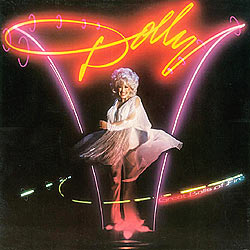The album was released May 28, 1979 on LP, 8-track, and cassette.
Singles
The album's first single, "You're the Only One", was released in May 1979. [1] It peaked at number one on the Billboard Hot Country Songs chart, Parton's eleventh song to do so. It also peaked at number 14 on the Billboard Adult Contemporary chart, and number 59 on the Billboard Hot 100. The song was also a hit in Canada, peaking at number one on both the RPM Country Singles chart and the RPM Adult Contemporary chart. It peaked at number 63 on the RPM Top Singles chart. The single peaked at number 33 in Australia on the Kent Music Report.
The second and third singles, "Great Balls of Fire" and "Sweet Summer Lovin'", were released as a double A-side in August 1979. [2] [3] "Great Balls of Fire" was aimed at pop radio and failed to chart on its own. Its only chart appearance was on the Billboard Hot Country Songs chart, where it charted as the flip-side of "Sweet Summer Lovin". "Sweet Summer Lovin'" was released to country radio and it peaked at number 7 on the Billboard Hot Country Songs chart. It also peaked at number 47 on the Billboard Adult Contemporary chart and number 77 on the Billboard Hot 100. "Sweet Summer Lovin'" was also a hit in Canada, peaking at number six on the RPM Country Singles chart and number eight on the RPM Adult Contemporary chart.
The fourth single, "Star of the Show", was released in December 1979 in Australia, New Zealand, and the Netherlands. It peaked at number 99 in Australia on the Kent Music Report.
Critical reception
The album received a positive review from Billboard , which said that "Parton has now firmly established herself in the pop field and reinforces her universal appeal with a collection of songs that showcase her versatility." They added that Parton's "sweet vocals" were aided by "a conglomeration of stellar players" that give the music a "needed punch." The review named "You're the Only One", "Help!", "Star of the Show", and "Do You Think That Time Stands Still" as the best cuts on the album and noted that the album's "attractive packag[ing] is a sales stimulant." [6]
Cashbox also gave a positive review of the album, saying that "Dolly proves how evocative she is on her latest RCA release." The review went on to say that Parton "lends her feathery voice to some thought-provoking love ballads, good time country numbers, streamlined rockers, and even throws in a dancin' number." The review concluded by saying that the "countrified version" of "Help!" and "knockout ballad" "Do You Think That Time Stands Still" are the standout cuts on the album. [7]
The New York Times determined that the album "isn't even an instance any more of a great talent being slicked up and distorted... It's just trivial in the most depressing sort of way." [8]
Writing for AllMusic, Mark Deming felt that "considering how well (and how sympathetically) Parton produced herself on her last few pre-crossover efforts...Dean Parks and Gregg Perry's studio settings [are] a bit disconcerting," but "they thankfully seem aware at all times who is in the spotlight, and Dolly, professional that she is, rises to the challenge on all ten tracks." He also noted that there are only four Parton compositions on the album and said that "it seems ironic that the most purely country cut on the LP is a cover of the Beatles' "Help!," which is given a sprightly neo-bluegrass arrangement." [4]
This page is based on this
Wikipedia article Text is available under the
CC BY-SA 4.0 license; additional terms may apply.
Images, videos and audio are available under their respective licenses.
